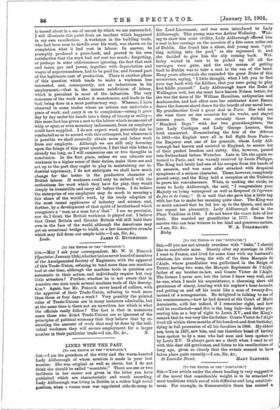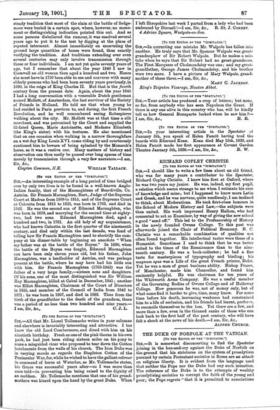[To TUE EDITOR OF THE "SPECTATOR."] Srg,—Your article under the
above heading is very suggestive of the moral that considerable weight is to be attached to most traditions which are of wide diffusion and long establish- ment. For example, in Somersetshire there has existed a steady tradition that most of the slain at the battle of Sedge- moor were buried in a certain spot, where, however, no monu- ment or distinguishing indication pointed this out. And as some persons disbelieved the rumour, it was resolved several years ago to put it to the test by digging at the place of reputed interment. Almost immediately on excavating the ground large quantities of bones were found, thus exactly verifying the tradition. And traditions extending over even several centuries may only involve transmission through three or four individuals, I am not yet quite seventy years of age, but I remember that about the year 1844) I saw in Cornwall an old woman then aged a hundred and two. Hence she must have in 1750 been able to see and converse with many elderly persons who had been born seventy years previously, in 1680, in the reign of King Charles U. But that is the fourth century from the present date. Again, about the year 1845 I had a long conversation with a venerable Dutch gentleman named Monett, of Amsterdam, the last survivor of the Society of Friends in Holland. He told me that when young he had resided in Paris previous to, and during, the first French Revolution, and he well remembered seeing Robespierre walking about the city. Mr. Mollett was at that time a silk merchant, and was patronised by the Court and supplied the ill-fated Queen, Marie Antoinette, and Madame Elizabeth (the King's sister) with his textures. He also mentioned that on one occasion when walking in a narrow thoroughfare on a wet day King Louis XVI. came riding by and courteously cautioned him to beware of being splashed by the Monarch's horse, as it was a restive one. Many matters of history and observation can thus easily be passed over long spaces of time merely by transmission through a very few narrators.—I am, Sir, &c.,







































 Previous page
Previous page